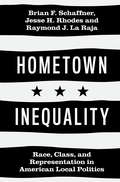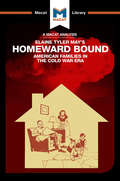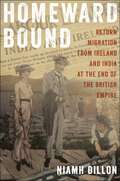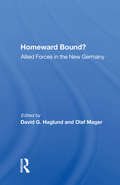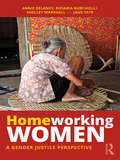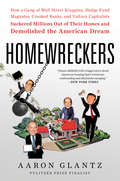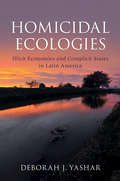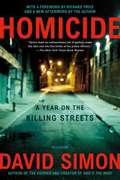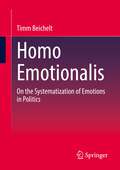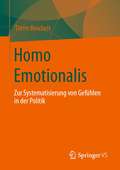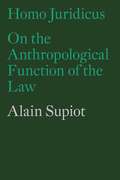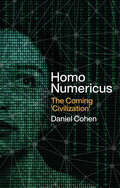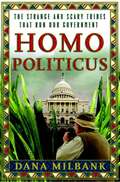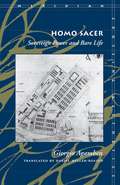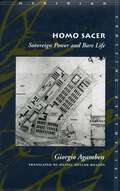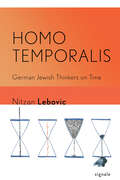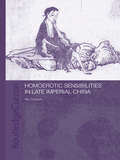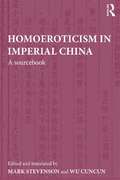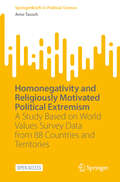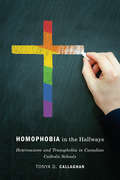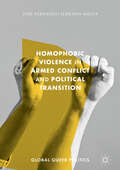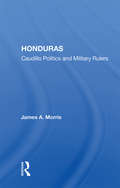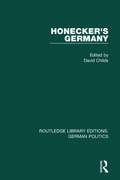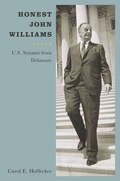- Table View
- List View
Hometown Inequality: Race, Class, and Representation in American Local Politics
by Jesse H. Rhodes Brian F. Schaffner Raymond J. La RajaLocal governments play a central role in American democracy, providing essential services such as policing, water, and sanitation. Moreover, Americans express great confidence in their municipal governments. But is this confidence warranted? Using big data and a representative sample of American communities, this book provides the first systematic examination of racial and class inequalities in local politics. We find that non-whites and less-affluent residents are consistent losers in local democracy. Residents of color and those with lower incomes receive less representation from local elected officials than do whites and the affluent. Additionally, they are much less likely than privileged community members to have their preferences reflected in local government policy. Contrary to the popular assumption that governments that are “closest” govern best, we find that inequalities in representation are most severe in suburbs and small towns. Typical reforms do not seem to improve the situation, and we recommend new approaches.
Homeward Bound: American Families in the Cold War Era
by Jarrod HomerElaine Tyler May’s 1988 Homeward Bound: American Families in the Cold War Era is a ground-breaking piece of historical and cultural analysis that uses its findings to build a strong argument for its author’s view of the course of modern US history. The aim of May’s study is to trace the links between Cold War politics and the domestic lives of everyday American families at the time. Historians have long noted the unique domestic trends of 1950s America, with its increased focus on the nuclear family, neatly divided traditional gender roles and aspirational, suburban consumer lifestyles. May’s contribution was to analyse the interplay between the domestic scene and the political ideologies of American government, and then to build a carefully-constructed argument that draws attention to the ways in which these seemingly disparate forces are in fact related. May’s key achievement was to use her analytical skills to understand the relationships between these different factors. She the traced ways in which domestic life and US foreign policy mirrored one another, showing that the structures and processes they aimed for, while different in scale, were essentially the same. She then carefully brought together different types of historical data, organizing her study to produce a carefully reasoned argument that the American suburban home was in certain direct ways the product of the ‘containment’ policies that ruled American foreign policy at the time.
Homeward Bound: Return Migration from Ireland and India at the End of the British Empire (The Glucksman Irish Diaspora Series)
by Niamh DillonFirsthand accounts of migrants who settled in Britain offer new insights into empire, belonging, migration, and diasporaHomeward Bound shines a light on a neglected aspect of twentieth-century migration history. It compares two groups of migrants—Southern Irish Protestants and the British in India—who “returned” to Britain from Ireland and India after independence in 1922 and 1947. By looking across national boundaries, Niamh Dillon explores both individual and collective narratives of imperial identity in the late British Empire and the prompts for return. For both groups, the success of national independence movements in the first half of the twentieth century was cataclysmic and prompted a large-scale migration to Britain. Between 1911 and 1926, the number of Protestants in the Irish Free State dropped from approximately 313,000 to 208,000, and much of the British population left India. Although these numbers are significant, these two groups have largely been ignored by historians and have not been compared before. Though instability in the new political order and lack of livelihood were determining factors in the decision to migrate, Dillon argues that Southern Irish Protestants and the British community in India “returned” to Britain after independence principally because these former elites no longer had a clearly defined role in the new post-colonial era. Return migrants chose Britain because of continuing connections with it as “home,” but often found their colonial experience was not valued in a country re-orienting itself to the post-war order. Through interviews with those who experienced these events first-hand and the recently opened files of the Irish Grants Committee at the National Archives in Britain, this book offers new insights into the history of migration and the affinity these migrants felt with Britain and with the empire.
Homeward Bound?: Allied Forces In The New Germany
by David G HaglundThe drastically altered European security context has forced Western defence planners and analysts to reassess core assumptions, including the future role of NATO. As the organization goes through what may be its most profound restructuring to date, one of the critical issues to be resolved is the stationing of Allied troops in Germany, the Allianc
Homeworking Women: A Gender Justice Perspective
by Shelley Marshall Annie Delaney Rosaria Burchielli Jane TateHomework; work that is categorised as informal employment, performed in the home, mainly for subcontractors and mostly undertaken by women. The inequities and injustices inherent in homework conditions maintain women’s weak bargaining position, preventing them from making any improvements to their lives via their work. The best way to tackle these issues is not to abolish, but to bring equality and justice to homework. This book contributes a gender justice framework to analyse and confront the issues and problems of homework. The authors propose four justice dimensions – recognition, representation, rights and redistribution – to examine and analyse homework. This framework also takes into account the structures and processes of capitalism and the patriarchy, and the relations of domination that are widely held to be the major factors that determine homework injustice. The authors discuss strategies and approaches that have worked for homeworkers, highlighting why they worked and the features that were beneficial for them. Homeworking Women will be of interest to individuals and organisations working with or for the collective benefit of homeworkers, academics and students interested in feminism, labour regulation, informal work, supply chains and social and political justice.
Homewreckers: How a Gang of Wall Street Kingpins, Hedge Fund Magnates, Crooked Banks, and Vulture Capitalists Suckered Millions Out of Their Homes and Demolished the American Dream
by Aaron GlantzIn the spirit of Evicted, Bait and Switch, and The Big Short, a shocking, heart-wrenching investigation into America’s housing crisis and the modern-day robber barons who are making a fortune off the backs of the disenfranchised working and middle class—among them, Donald Trump and his inner circle. Two years before the housing market collapsed in 2008, Donald Trump looked forward to a crash: “I sort of hope that happens because then people like me would go in and buy,” he said. But our future president wasn’t alone. While millions of Americans suffered financial loss, tycoons pounced to heartlessly seize thousands of homes—their profiteering made even easier because, as prize-winning investigative reporter Aaron Glantz reveals in Homewreckers, they often used taxpayer money—and the Obama administration’s promise to cover their losses. In Homewreckers, Glantz recounts the transformation of straightforward lending into a morass of slivered and combined mortgage “products” that could be bought and sold, accompanied by a shift in priorities and a loosening of regulations and laws that made it good business to lend money to those who wouldn’t be able to repay. Among the men who laughed their way to the bank: Trump cabinet members Steve Mnuchin and Wilbur Ross, Trump pal and confidant Tom Barrack, and billionaire Republican cash cow Steve Schwarzman. Homewreckers also brilliantly weaves together the stories of those most ravaged by the housing crisis. The result is an eye-opening expose of the greed that decimated millions and enriched a gluttonous few.
Homicidal Ecologies: Illicit Economies and Complicit States in Latin America (Cambridge Studies in Comparative Politics)
by Deborah J. YasharWhy has violence spiked in Latin America's contemporary democracies? What explains its temporal and spatial variation? Analyzing the region's uneven homicide levels, this book maps out a theoretical agenda focusing on three intersecting factors: the changing geography of transnational illicit political economies; the varied capacity and complicity of state institutions tasked with providing law and order; and organizational competition to control illicit territorial enclaves. These three factors inform the emergence of 'homicidal ecologies' (subnational regions most susceptible to violence) in Latin America. After focusing on the contemporary causes of homicidal violence, the book analyzes the comparative historical origins of weak and complicit public security forces and the rare moments in which successful institutional reform takes place. Regional trends in Latin America are evaluated, followed by original case studies of Central America, which claims among the highest homicide rates in the world.
Homicide: A Year On The Killing Streets
by David SimonThe scene is Baltimore. Twice every three days another citizen is shot, stabbed, or bludgeoned to death. At the center of this hurricane of crime is the city's homicide unit, a small brotherhood of hard men who fight for whatever justice is possible in a deadly world. David Simon was the first reporter ever to gain unlimited access to a homicide unit, and this electrifying book tells the true story of a year on the violent streets of an American city. The narrative follows Donald Worden, a veteran investigator; Harry Edgerton, a black detective in a mostly white unit; and Tom Pellegrini, an earnest rookie who takes on the year's most difficult case, the brutal rape and murder of an eleven-year-old girl. Originally published fifteen years ago, Homicide became the basis for the acclaimed television show of the same name. This new edition―which includes a new introduction, an afterword, and photographs―revives this classic, riveting tale about the men who work on the dark side of the American experience.
Homo Emotionalis: On the Systematization of Emotions in Politics
by Timm BeicheltIn this book, important works and approaches of policy-oriented emotion research are brought into a systematic context. For this purpose, three different types of emotions are elaborated, which in their totality constitute Homo Emotionalis: binary emotions, basic emotions, reflexive emotions. They correspond to individual-psychological stages of development, but are also relevant in the social and political handling of emotions. The interplay of emotion types and social constellations leads to different modes of political action, which shape different forms of emotional politics. In each case, individual logics emerge along which emotional politics is pursued. With its interdisciplinary focus, this volume is aimed at political scientists, anthropologists, sociologists and social psychologists.
Homo Emotionalis: Zur Systematisierung von Gefühlen in der Politik
by Timm BeicheltIn diesem Buch werden wichtige Werke und Ansätze der politikorientierten Emotionenforschung in einen systematischen Zusammenhang gebracht. Dafür werden drei unterschiedliche Typen von Emotionen herausgearbeitet, die in ihrer Gesamtheit den Homo Emotionalis ausmachen: binäre Emotionen, Basisemotionen, reflexive Emotionen. Sie entsprechen individualpsychologischen Entwicklungsstufen, sind aber auch im sozialen und politischen Umgang mit Emotionen relevant. Das Zusammenspiel von Emotionentypen und gesellschaftlichen Konstellationen führt zu verschiedenen Modi politischen Handelns, die unterschiedliche Formen von emotionaler Politik prägen. Es entstehen jeweils eigene Logiken, entlang derer Emotionenpolitik betrieben wird. Der Band richtet sich mit seinem interdisziplinären Fokus an Politikwissenschaft*innen, Anthropolog*innen, Soziolog*innen und Sozialpsycholog*innen.
Homo Juridicus: On the Anthropological Function of the Law
by Alain SupiotIn this groundbreaking work, French legal scholar Alain Supiot examines the relationship of society to legal discourse.He arguesthat the law is how justice is implmented in secular society, but it isnot simply a technique to be manipulated at will: it is also anexpression of the core beliefs of the West. We must recognize itsuniversalizing, dogmatic nature and become receptive to otherinterpretations from non-Western cultures to help us avoid the clashof civilizations. In Homo Juridicus, Supiotdeconstructs the illusion of a world that has become "flat’’ andundifferentiated, regulated only by supposed "laws" of science andthe economy, and peopled by contract-makers driven only by thecalculation of their individual interests. Such a liberal perspectiveis nothing but the flipside of the notion of the withering away of lawand the state, promoted this time not under the banner of the strugglebetween classes, but rather in the name of the free competition betweensovereign individuals.Supiot’s exploration of the development of the"legal subject"—the individual as formed through a dense web ofcontracts and laws—is set to become a classic work of social theory.
Homo Numericus: The coming 'civilization'
by Daniel CohenFrom Amazon to Tinder, from Google to Deliveroo, there is no facet of human life which the digital revolution has not streamlined and dematerialised. Its objective was to reduce the cost of physical interactions by forgoing face-to-face interactions, a direct result of the free-market shock of the 1980s, which sought to seamlessly expand the marketplace in every possible dimension. Today, we can be algorithmically entertained, educated, cared for and courted in a way which was impossible in the old industrial society, where institutions structured the social world. Today, these institutions have been replaced by monetised virtual contact. As with the industrial revolution of the past, the digital revolution is creating a new economy and a new sensibility, bringing about a radical revaluation of society and its representations. While obsessed with the search for an efficient management of human relations, the new digital capitalism gives rise to an irrational and impulsive Homo numericus prone to an array of addictive behaviours. Far from producing a new agora, social media produce a radicalization of public debate in which hate-filled speech directed against adversaries becomes the norm. The good news is that these outcomes are not inevitable. Technologies have not taken control of our lives. The digital revolution also offers an alternative path: one that leads to a world in which every word deserves to be listened to, without a transcendent truth hanging over it. Are we able to seize the new opportunities opened up by the digital revolution without succumbing to its dark side?
Homo Politicus: The Strange and Scary Tribes That Run Our Government
by Dana MilbankWashington's most acerbic (and feared) columnist, the Washington Post's Dana Milbank, skewers the peculiar and alien tribal culture of politics. Deep within the forbidding land encircled by the Washington Beltway lives the tribe known as Homo politicus. Their ways are strange, even repulsive, to civilized human beings; their arcane rites often impenetrable; their language coded and obscure. Violating their complex taboos can lead to sudden, harsh, and irrevocable punishment...
Homo Sacer: Sovereign Power and Bare Life
by Giorgio AgambenThe author in this book aims to connect the problem of pure possibility, potentiality, and power with the problem of political and social ethics in a context where the latter has lost its previous religious, metaphysical, and cultural grounding.
Homo Sacer: Sovereign Power and Bare Life (Meridian: Crossing Aesthetics)
by Giorgio AgambenThe work of Giorgio Agamben, one of Italy's most important and original philosophers, has been based on an uncommon erudition in classical traditions of philosophy and rhetoric, the grammarians of late antiquity, Christian theology, and modern philosophy. Recently, Agamben has begun to direct his thinking to the constitution of the social and to some concrete, ethico-political conclusions concerning the state of society today, and the place of the individual within it. In Homo Sacer, Agamben aims to connect the problem of pure possibility, potentiality, and power with the problem of political and social ethics in a context where the latter has lost its previous religious, metaphysical, and cultural grounding. Taking his cue from Foucault's fragmentary analysis of biopolitics, Agamben probes with great breadth, intensity, and acuteness the covert or implicit presence of an idea of biopolitics in the history of traditional political theory. He argues that from the earliest treatises of political theory, notably in Aristotle's notion of man as a political animal, and throughout the history of Western thinking about sovereignty (whether of the king or the state), a notion of sovereignty as power over "life" is implicit. The reason it remains merely implicit has to do, according to Agamben, with the way the sacred, or the idea of sacrality, becomes indissociable from the idea of sovereignty. Drawing upon Carl Schmitt's idea of the sovereign's status as the exception to the rules he safeguards, and on anthropological research that reveals the close interlinking of the sacred and the taboo, Agamben defines the sacred person as one who can be killed and yet not sacrificed—a paradox he sees as operative in the status of the modern individual living in a system that exerts control over the collective "naked life" of all individuals.
Homo Temporalis: German Jewish Thinkers on Time (Signale: Modern German Letters, Cultures, and Thought)
by Nitzan Itzhak LebovicHomo Temporalis focuses on the importance of temporal concepts for four German Jewish thinkers who profoundly shaped twentieth-century intellectual history: Martin Buber, Walter Benjamin, Hannah Arendt, and Paul Celan. By analyzing the concept of time, Nitzan Lebovic explores Buber's stress on the temporality of the dialogue between I and Thou; Benjamin's now-time and "dialectics in standstill"; Arendt's understanding of democracy as "natality" or a "permanent revolution"; and the "breathturn" that informs Celan's poetry. Framing the reception of German Jewish thinking in the second half of the twentieth century as a parallel story to the rise of the modern humanities, Homo Temporalis also highlights how these foundational temporal concepts illuminate the causes of the present crisis in the humanities and its disciplinary limitations in the age of biopolitics and the Anthropocene.
Homoerotic Sensibilities in Late Imperial China (Routledge/Asian Studies Association of Australia (ASAA) East Asian Series #Vol. 7)
by Cuncun WuHomoerotic Sensibilities in Late Imperial China is the richest exploration to date of late imperial Chinese literati interest in male love. Employing primary sources such as miscellanies, poetry, fiction and 'flower guides', Wu Cuncun argues that male homoeroticism played a central role in the cultural life of late imperial Chinese literati elites. Countering recent arguments that homosexuality was marginal and disparaged during this period, the book also seeks to trace the relationship of homoeroticism to status and power.In addition to historical portraits and analysis, the book also advances the concept of 'sensibilities' as a method for interpreting the complex range of homoerotic texts produced in late imperial China.
Homoeroticism in Imperial China: A Sourcebook
by Mark Stevenson Wu CuncunBringing together over sixty pre-modern Chinese primary sources on same-sex desire in English translation, Homoeroticism in Imperial China is an important addition to the growing field of the comparative history of sexuality and provides a window onto the continuous cultural relevance of same-sex desire in Chinese history. Negotiating what can be a challenging area for both specialists and non-specialists alike, this sourcebook provides: accurate translations of key original extracts from classical Chinese concise explanations of the context and significance of each entry translations which preserve the aesthetic quality of the original sources An authoritative and well organised guide and introduction to the original Chinese sources, this sourcebook covers histories and philosophers, poetry, drama (including two complete plays), fiction (including four complete short stories and full chapters from longer novels) and miscellanies. Each of these sections are organised chronologically, and as well as the general introduction, short introductions are provided for each genre and source. Revealing what is a remarkably sophisticated and complex literary tradition, Homoeroticism in Imperial China is an essential sourcebook for students and scholars of Imperial Chinese history and culture and sexuality studies.
Homonegativity and Religiously Motivated Political Extremism: A Study Based on World Values Survey Data from 88 Countries and Territories (SpringerBriefs in Political Science)
by Arno TauschThis open access book describes the world’s increasingly multicultural societies face the problem that more and more diverse lifestyles (LGBTQIA+ communities) are not universally accepted, and that today, in addition to xenophobia, racism and anti-Semitism, there is substantial homonegativity. This book explores this issue, reviews the empirical literature on the subject and provides new empirically based evidence on a global and European scale. Based on an analysis of The World Values Survey using the statistical software SPSS, it provides a scientifically sound answer to the question of which social groups in Europe and around the globe are more homophobic and which are less, together with insights into the multivariate relationships between homonegativity and religiously motivated political extremism. The extensive and representative statistical samples allow cautious conclusions to be drawn for smaller religious groups in the European Union and other countries around the world.
Homophobia in the Hallways: Heterosexism and Transphobia in Canadian Catholic Schools
by Tonya D. CallaghanSection 15 of the Canadian Charter of Rights and Freedoms ensures equality regarding sexual orientation and gender identity in Canada. Despite this, gay, lesbian, and gender-nonconforming teachers in publicly-funded Catholic schools in Ontario and Alberta are being fired for living lives that Church leaders claim run contrary to Catholic doctrine about non-heterosexuality; meanwhile, requests from students to establish Gay/Straight Alliances are often denied. In Homophobia in the Hallways, Tonya D. Callaghan interrogates institutionalized homophobia and transphobia in the publicly-funded Catholic school systems of Ontario and Alberta. Featuring twenty interviews with students and teachers who have faced overt discrimination in Catholic schools, the book blends theoretical inquiry and real-world case study, making Callaghan’s study a unique insight into religiously-inspired heterosexism and genderism. She uncovers the causes and effects of the long-standing disconnect between Canadian Catholic schools and the Charter by comparing the treatment of and attitudes towards lesbian, gay, bisexual, transgender and queer teachers and students in these publicly-funded systems.
Homophobic Violence in Armed Conflict and Political Transition
by José Fernando Serrano-AmayaThis book argues that homophobia plays a fundamental role in disputes for hegemony between antagonists during political transitions. Examining countries not often connected in the same research—Colombia and South Africa—the book asserts that homophobia, as a form of gender and sexual violence, contributes to the transformation of gender and sexual orders required by warfare and deployed by armed groups. Anti-homosexual violence also reinforces the creation of consensus around these projects of change. The book considers the perspective of individuals and their organizations, for whom such hatreds are part of the embodied experience of violence caused by protracted conflicts and social inequalities. Resistance to that violence are reason to mobilize and become political actors. This book contributes to the increasing interest in South-South comparative analyses and the need of theory building based on case-study analyses, offering systematic research useful for grass root organizations, practitioners, and policy makers.
Honduras: Caudillo Politics And Military Rulers
by James A. MorrisSince the retirement of longtime dictator Tiburcio Carías Andino (1932-1949), the search for institutional stability in Honduras has led to both democratically elected governments and the imposed discipline of military rule. Social and economic change has contributed to the growth of middle-class urban groups, strongly organized labor unions, and a vigorous peasant movement. The Honduran armed forces, established in modern form only after World War II, filled the vacuum of political power that developed as the Liberal and National political parties failed to address the problems created by change and national development, but the authoritarianism of military rule has been countered by historical patterns of caudillo politics. Despite the revolutionary turmoil that surrounds the country, Hondurans have successfully conducted national elections and installed a freely elected civilian government after more than ten years of military rule. It is within this mix of "traditional" and "praetorian" governing modes that Hondurans have fashioned a style of politics conducive to compromise, which accounts for the country's relative tranquillity today. In this first comprehensive study of contemporary Honduras—its land, people, economy, and politics—to be published in English, Dr. Morris also outlines the historical context that has shaped the society of this now geopolitically important nation and conditioned its political dynamics over the past three decades. His analysis illuminates the characteristics that distinguish Honduras from its Central American neighbors and that may dictate a unique course for its political evolution.
Honecker's Germany: Moscow's German Ally (Routledge Library Editions: German Politics)
by David ChildsPicking up many of themes of David Childs’ earlier book, The GDR: Moscow’s German Ally, this book discusses the German Democratic Republic (GDR) from 1971 until the mid 1980s. Written at a time when the GDR was one of the most modern and successful socialist states, with a growing importance within the socialist bloc and the global stage, this books examined a number of important topics such as GDR relations with the USSR and the USA, the GDR Navy, the church in the GDR and the economy of the GDR.
Honest John Williams: U.S. Senator from Delaware (Cultural Studies of Delaware and the Eastern Shore)
by Carol E. HoffeckerJohn J. Williams was elected to the U.S. Senate in 1946, defeating incumbent Democratic U.S. Senator James M. Tunnell. Honest John Williams: U.S. Senator from Delaware examines the political career of Williams, a political novice who established himself as an important advocate for fiscal probity and integrity in government during four successive terms in the U.S. Senate between 1947 and 1970. Over the course of those twenty-four years in the Senate, which spanned the administrations of five separate U.S. presidents (Truman, Eisenhower, Kennedy, Johnson, and Nixon), Williams positioned himself as an opponent of wasteful government spending and corruption, often working "across the aisle" in order to achieve specific political goals. In Honest John Williams, noted Delaware historian Carol E. Hoffecker offers readers a comprehensive look at the legislative course forged by Delaware’s first four-term senator, a chicken-feed dealer born on a farm near Sussex County who went on to become an important advocate for fiscal probity and integrity in twentieth-century American politics.
Honestly, She Doesn't Live Here Anymore
by Pamela WickIn the charged political landscape of Reagan-era Washington, a young woman finds herself grappling with her father&’s high-profile scandal and her own impending divorce, forcing her to confront her privileged childhood and navigate the notoriety of a personal friendship with the first family.I think about my glamorous wedding again. I imagine myself choking on a cheese ball, in my lace wedding gown, guests rushing over arguing about who does the best Heimlich maneuver, my face bright red from lack of oxygen. Then, as if that weren&’t bad enough, I pass out on the dance floor of the tented tennis court where our lavish reception was held. My father, in his tux, at the mic, in front of the Les Brown Orchestra, telling everyone the marriage won&’t last and he might go to prison. The shattered fairy tale is on a loop inside my head. How did my life reverse itself so drastically? For Pamela Wick, President and Mrs. Reagan were simply Ronnie and Nancy, her parents&’ best friends. What began with Pamela&’s mom and Nancy organizing the chili booth at their kids&’ school fair in Los Angeles soon propelled Pamela&’s parents into pivotal roles that would help Reagan secure the California governorship and eventually the grand prize: the White House. Determined to win her parents&’ approval as the perfect daughter, Pamela marries the son of Republican royalty and joins them in DC to begin her fairytale in the nation&’s Capitol—or so she thought. What follows is her firsthand look behind the scenes at the gilded age of the Reagan years in Washington, DC—an era now long gone. Sometimes hilarious, sometimes heartbreaking, but always insightful, the narrative chronicles her journey to penetrate Washington society at the highest levels—from Christmas Eve at her family home with President Reagan dressed as Santa Claus, to intimate dinners at the White House. But behind the golden gates, Pam&’s marriage is unraveling, and her father&’s high-profile political scandal threatens to destroy their carefully constructed life. Soon, she&’s trading in glitzy state dinners for congressional hearings attacking her father, and at the center of the Reagan revolution, Pam&’s own personal uprising begins.
